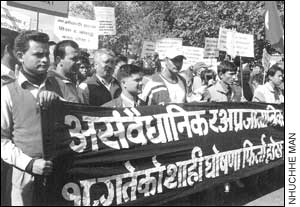 It looks like we're finally on the threshold of revolutionary change. For the first time in 12 years, Constitution Day observances were dominated by calls for consolidating the supreme law through radical overhaul or outright replacement. Forget about the motives and focus on the coherence that has entered the national conversation. The crude compromises foisted on us as weighty accomplishments were becoming too heavy. For the nation's left, right and centre, a constituent assembly is no longer a notion. The only people still describing this constitution as one of the world's best are its least prominent framers. Those who argued that the basic law could go unchanged for another half century have decided to keep quiet.
It looks like we're finally on the threshold of revolutionary change. For the first time in 12 years, Constitution Day observances were dominated by calls for consolidating the supreme law through radical overhaul or outright replacement. Forget about the motives and focus on the coherence that has entered the national conversation. The crude compromises foisted on us as weighty accomplishments were becoming too heavy. For the nation's left, right and centre, a constituent assembly is no longer a notion. The only people still describing this constitution as one of the world's best are its least prominent framers. Those who argued that the basic law could go unchanged for another half century have decided to keep quiet. 
The pronouncements of pundits and politicos over the weekend revived memories of the last anniversary of the Panchayat constitution. An ailing Surya Bahadur Thapa had warned an adamant Marich Man Singh Shrestha of the dire costs of failure to move with the times. The pancha dissident-in-chief was in full action four months before the tripartite Narayanhity accord.
Once again, calls for change are coming from within the system and the credit must go to the Nepali Congress. For too long, Kangresis have wallowed in the fallacy that they did the palace a great favour by dropping the demand for a constituent assembly in 1957. Sure, they brought democracy twice. There must be a reason why they squandered it both times. The realisation that those who stumble on the same stone twice deserve to have their necks broken has set in. Senior Kangresis are wondering out aloud why they should continue to be the palace's principal shield when the feeling isn't mutual. (I don't know what the palace thinks, but it is a little awkward to see the only party associated with attempted regicide claiming to be the monarchy's strongest armour.)
The CPN-UML is less enthusiastic about a constituent assembly. This is odd, considering its ultimate goal of a republican Nepal. It's unfair, though, to expect firm resolve from a party that hasn't been able to extend full support to a constitution it helped draft. The split personality that surfaced on the Mahakali treaty, the emergency proclamation and the dissolution of the House of Representatives is an integral part of the party's survival mechanism. (And lest we forget, the UML expected to win the parliamentary elections supposed to have started two days ago.) Once the political currents become clearer, our comrades can be expected to draft a convoluted document supporting a constituent assembly.
The Rastriya Prajatantra Party and Nepal Sadbhavana Party had no direct role in drafting this constitution. Now in power, they can either make up for the marginalisation or bring a fresh perspective to the political process. The smaller communist groups caught between the UML and Maoists can help bring the two closer. This is a good time for the rest of our 100-plus parties to prove their contention that you don't have to be in power to do the country some good.
Things get a little scary when you consider the practical aspects. Even in the best of times, the two big parties that had the two-thirds majority needed to amend the constitution couldn't agree on what should be changed. When words like Sikkimisation and sell-out hover over the debate, we know we've reached the precipice. We must nevertheless confront our fears, especially when the benefits of change could outweigh its costs.
A constituent assembly could do much more than clear the runway for the Maoists' long-awaited safe landing. The Prachanda-led political commissars would have firmer ground from which to open direct negotiations with renegades that refuse to lay down their weapons. The interregnum would allow the mainstream parties to get a better idea of the shift in the 1990 balance of power. Prime Minister Lokendra Bahadur Chand has a rare opportunity to prove that a government struggling for legitimacy doesn't have to lose its sense of purpose. ("We'll bring the Maoists to the negotiating table, or vacate our chairs" could be the cabinet's motto for the month. ) The palace, which perennially feels compelled to invoke the popular will without really being sure what that is, will have fulfilled a pledge made 51 years ago. The biggest winners will be the sovereign people.
We can start taking responsibility for who we are and what we do. Now wouldn't that be revolutionary?


